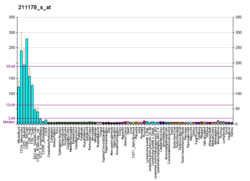Top Qs
Timeline
Chat
Perspective
PSTPIP1
Enzyme found in humans From Wikipedia, the free encyclopedia
Remove ads
Proline-serine-threonine phosphatase-interacting protein 1 is an enzyme that in humans is encoded by the PSTPIP1 gene.[5][6]
Remove ads
Remove ads
Interactions
PSTPIP1 has been shown to interact with:
See also
References
Further reading
Wikiwand - on
Seamless Wikipedia browsing. On steroids.
Remove ads






